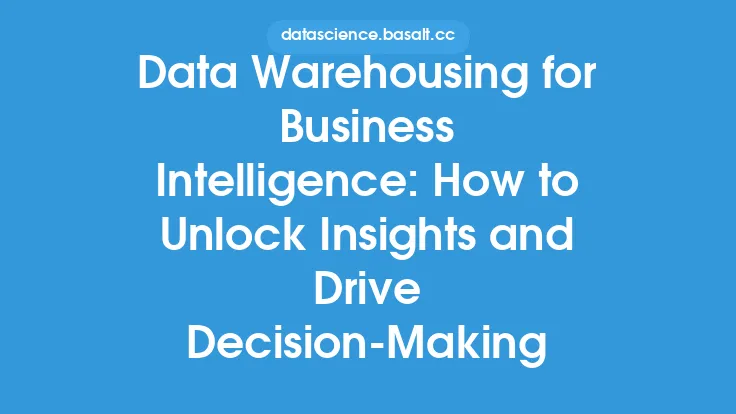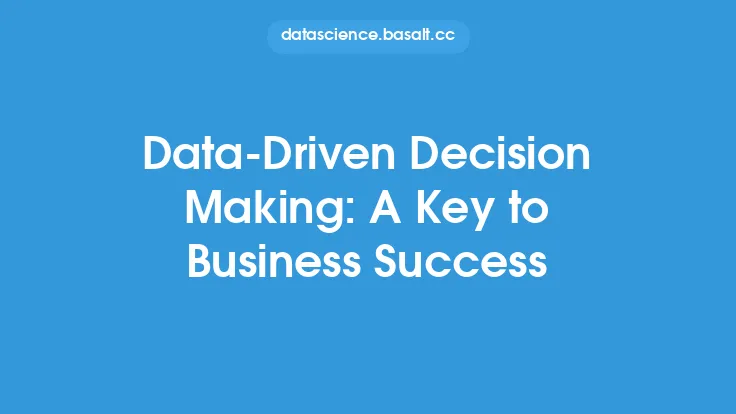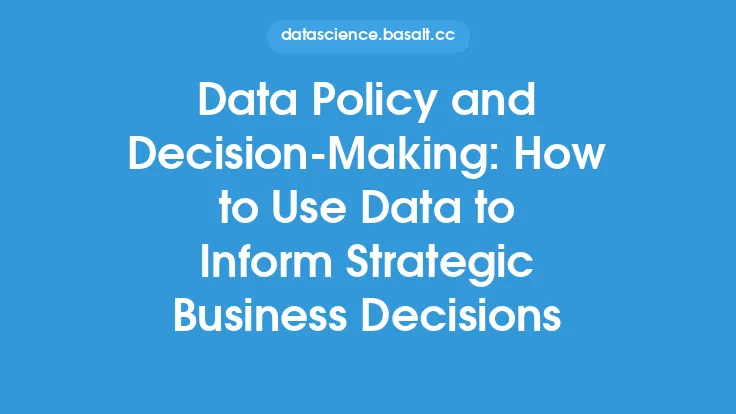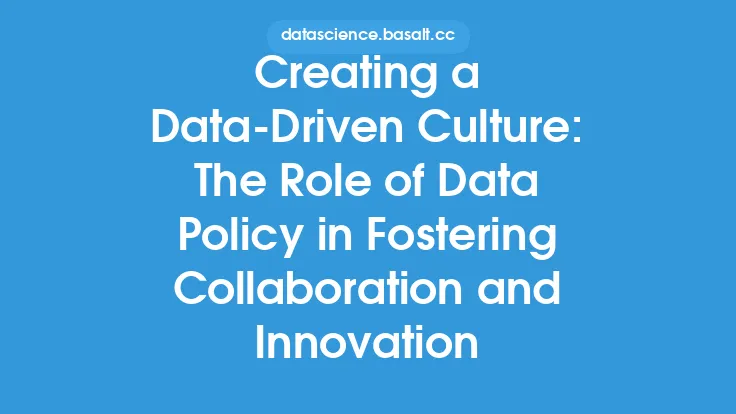In today's digital age, organizations are generating and collecting vast amounts of data from various sources, including customer interactions, social media, IoT devices, and more. This data has the potential to be a powerful catalyst for digital transformation, driving business growth, improving operational efficiency, and enhancing customer experiences. However, to unlock the full potential of data, organizations need a well-defined data policy that outlines how data is collected, stored, processed, and used. A data policy serves as a foundation for data governance, ensuring that data is managed in a way that is secure, compliant, and aligned with business objectives.
Introduction to Data Policy
A data policy is a set of guidelines and rules that govern the management and use of data within an organization. It provides a framework for ensuring that data is accurate, complete, and consistent, and that it is used in a way that is ethical, secure, and compliant with regulatory requirements. A well-defined data policy is essential for organizations that want to leverage data to drive business growth, as it helps to establish trust with customers, partners, and stakeholders, and ensures that data is used in a way that is transparent and accountable.
Key Components of a Data Policy
A data policy typically includes several key components, including data classification, data retention, data security, data privacy, and data governance. Data classification involves categorizing data based on its sensitivity and importance, and applying appropriate controls to ensure that it is handled and stored securely. Data retention policies outline how long data is kept, and how it is disposed of when it is no longer needed. Data security policies outline the measures that are taken to protect data from unauthorized access, theft, or damage, while data privacy policies outline how personal data is collected, used, and protected. Data governance policies outline the roles and responsibilities of individuals and teams involved in data management, and ensure that data is managed in a way that is consistent with business objectives.
Data Policy and Digital Transformation
A well-defined data policy is essential for digital transformation, as it provides a foundation for leveraging data to drive business growth. Digital transformation involves using digital technologies to transform business models, processes, and customer experiences, and data is a critical component of this process. By establishing a data policy, organizations can ensure that data is managed in a way that is secure, compliant, and aligned with business objectives, and that it is used to drive business growth and improvement. This can involve using data analytics to identify new business opportunities, improve operational efficiency, and enhance customer experiences.
Data Policy and Business Growth
A data policy can drive business growth in several ways. Firstly, it can help organizations to identify new business opportunities, by providing insights into customer behavior, market trends, and competitor activity. Secondly, it can help organizations to improve operational efficiency, by providing insights into business processes, and identifying areas for improvement. Thirdly, it can help organizations to enhance customer experiences, by providing personalized and targeted marketing, and improving customer service. Finally, it can help organizations to reduce risk, by providing insights into potential risks and threats, and enabling proactive measures to be taken to mitigate them.
Technical Implementation of Data Policy
The technical implementation of a data policy involves several key components, including data management systems, data analytics tools, and data security technologies. Data management systems, such as data warehouses and data lakes, provide a centralized repository for storing and managing data, and enable data to be integrated, processed, and analyzed. Data analytics tools, such as business intelligence and data science platforms, provide the ability to analyze and visualize data, and gain insights into business operations and customer behavior. Data security technologies, such as encryption and access control, provide the ability to protect data from unauthorized access, theft, or damage.
Best Practices for Implementing a Data Policy
Implementing a data policy requires a structured approach, and several best practices can be followed to ensure success. Firstly, organizations should establish a data governance framework, that outlines the roles and responsibilities of individuals and teams involved in data management. Secondly, organizations should classify and categorize data, based on its sensitivity and importance, and apply appropriate controls to ensure that it is handled and stored securely. Thirdly, organizations should establish data retention and disposal policies, that outline how long data is kept, and how it is disposed of when it is no longer needed. Finally, organizations should regularly review and update their data policy, to ensure that it remains relevant and effective.
Challenges and Opportunities
Implementing a data policy can be challenging, and several obstacles may need to be overcome. Firstly, organizations may need to overcome cultural and organizational barriers, to establish a data-driven culture, and ensure that data is used to drive business growth. Secondly, organizations may need to address technical challenges, such as integrating disparate data systems, and ensuring that data is accurate and complete. Thirdly, organizations may need to address regulatory challenges, such as ensuring compliance with data protection regulations, and managing data privacy risks. However, the opportunities presented by a data policy are significant, and can drive business growth, improve operational efficiency, and enhance customer experiences.
Conclusion
In conclusion, a data policy is a critical component of data governance, and provides a foundation for leveraging data to drive business growth. By establishing a data policy, organizations can ensure that data is managed in a way that is secure, compliant, and aligned with business objectives, and that it is used to drive business growth and improvement. A data policy can help organizations to identify new business opportunities, improve operational efficiency, and enhance customer experiences, and can reduce risk by providing insights into potential risks and threats. By following best practices, and addressing challenges and opportunities, organizations can implement a data policy that drives business growth, and establishes a foundation for long-term success.





